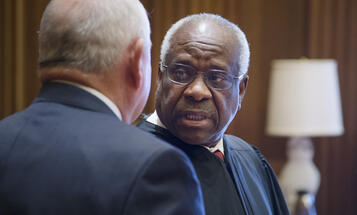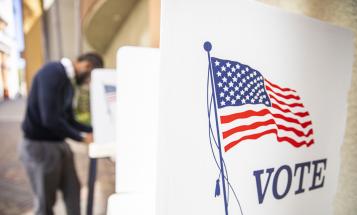
Agents of Influence: Billionaires Up, Journalists Down, Says Pew
This week the Pew Research Center reported that candidate campaigns and outside spending groups have nearly a third more influence over narratives around presidential candidates' characters than they did just 12 years ago, whereas journalist influence has shrunk by nearly half.
This interesting fact becomes quite disturbing in the proper context.
As Demos and U.S. PIRG Education Fund showed in our recent report, Million-Dollar Megaphones, the vast majority of campaign spending by "outside" (non-candidate) groups falls into two basic categories: that which is funded by a tiny group of millionaire and billionaire donors, and that which is funded by, well, we have no idea.
For example, just 47 people giving at least $1 million are responsible for more than half of all funds raised from individuals by Super PACs. And, more than half of the "outside" spending on the presidential race has come from groups that aren't required to disclose their donors. (This report confirms how these "dark money" groups are far outspending Super PACs -- which for all their faults at least report their donors).
Candidate fundraising is more transparent, but politicians have long depended upon an elite "donor class" to fund their campaigns—a tiny number of people who can afford to give $1,000, $2,000, or now even $5,000 in an election cycle.
Rather than consuming reports from professional journalists who are paid to sort truth from fiction and portray a fair (or at least credible) portrait of our nation's aspiring leaders, more and more Americans are forming views of presidential candidates that are shaped by the narrow slice of super-rich individuals and well-heeled special interests who fund candidates and outside spending groups—many of whom operate in the shadows, shielded from disclosure by "dark money" groups.
And lest you think the Pew report speaks only to whether President Obama or Governor Romney are good or bad guys, a relatively binary view that might not be so skewed by wealth—not so. The leading narrative about President Obama's character, for example, is that he has "failed to do enough to help the economy." Some of the themes around Governor Romney are related to the economy as well.
The one percent—no, the one hundredth of one percent—are shaping what the rest of us think about the presidential candidates' performance (past or prospective) on the economy. And, it might not shock you to learn that the wealthy have different views and priorities than the rest of us—especially when it comes to the economy.
This should give all of us pause. This new report raises the stakes on the urgent need to democratize the role of money in political campaigns and build a democracy in which the size of a citizen's wallet doesn't determine the strength of her voice.
We can't afford to wait another 12 years, as millionaires and billionaires strengthen their stranglehold over our political process.



